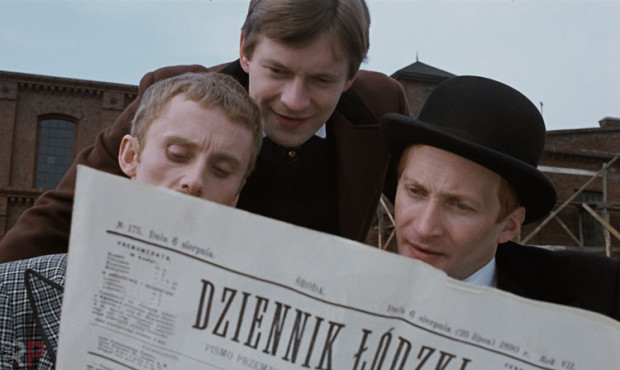Andrzej Wajda’s The Promised Land, screened on June 17 by the Toronto International Film Festival and part of its ongoing retrospective on contemporary Polish cinema, transports us back to early 20th century Lodz, a multi-ethnic city in central Poland that brings the uglier aspects of the industrial revolution up close and personal.
Based on a novel by Wladyslaw Reymont, The Promised Land is about three ambitious and grasping Polish entrepreneurs — a Catholic, an ethnic German and a Jew — who establish a textile factory, only to see it go up in smoke.
In essence, this lavishly-mounted movie, clocking in at 170 minutes, is about robber baron capitalism, which traded in exploitation, ruthlessness, fear and greed.
Polish industrialists, who established Lodz as Poland’s textile capital, are depicted here as scoundrels who care only for themselves. This harsh portrayal comes as no surprise. The Promised Land, which unfolds in Polish, German and Yiddish, was released in 1975, during the communist era, when capitalism was very much of a dirty word.
Lodz is seen as a grimy city dominated by the belching chimneys of faceless factories. The workers, mere cogs on a factory floor crammed with whirring and clattering machinery, are treated callously. They are truly the wretched of the earth, and Wajda conveys their misery in realistic fashion.
Karol Borowiecki (Daniel Olbrychski), Max Baum (Andrzej Seweryn) and Moryc Welt (Wojciech Pszoniak), the budding entrepreneurs who dream of building a factory and joining Lodz’s rapacious ruling class, are not exactly peas in a pod.
Borowiecki, an aristocrat, realizes that times are changing and doesn’t want to be left behind. Baum, of German origin, must convince his father that the 19th century is a thing of the past. Welt, a Jewish wheeler dealer with a twinkle in his eye, whips their idea into shape. They have little in common apart from their desire to climb the greasy ladder of success and become millionaires.
Their role models, ethnic Germans and Jews, are hard, cynical men. Kessler, a sexual predator, preys on a naive young woman who actually believes he will marry her. Bucholc, cruel to the marrow of his bones, beats his employees. Grunspan, whose much younger wife carries on an affair with Borowiecki, thinks only of profits.
The juxtaposition between their lives and that of the masses is stunning. While the factory owners live off the fat of the land in opulent splendour, the workers eke out a bare existence.
In Lodz, glaring economic disparities go hand in hand with ethnocentrism. Jews are regarded with condescension and are considered less than real Poles, yet Moryc takes all these antisemitic pokes in stride. Ethnic Germans are not held in as much contempt, nor are they really marginalized, but they come across in an unflattering light.
The Promised Land is lush and ripe with possibilities, and the characters tend to be theatrical, but this is a film that can sweep you off your feet.
Full programme details at http://tiff.net/cinematheque/masterpieces-of-polish-cinema
Trailer: http://vimeo.com/77210129
